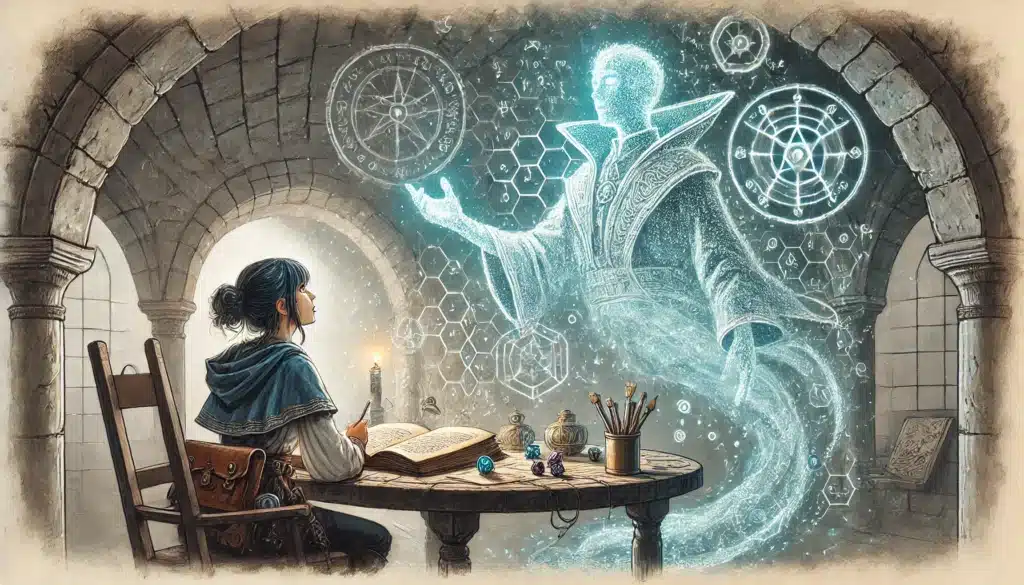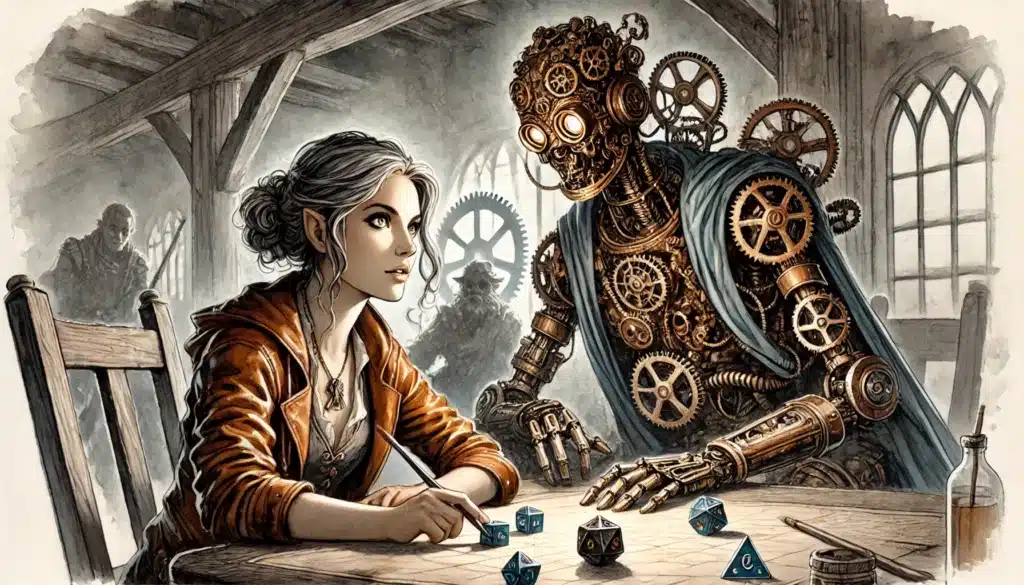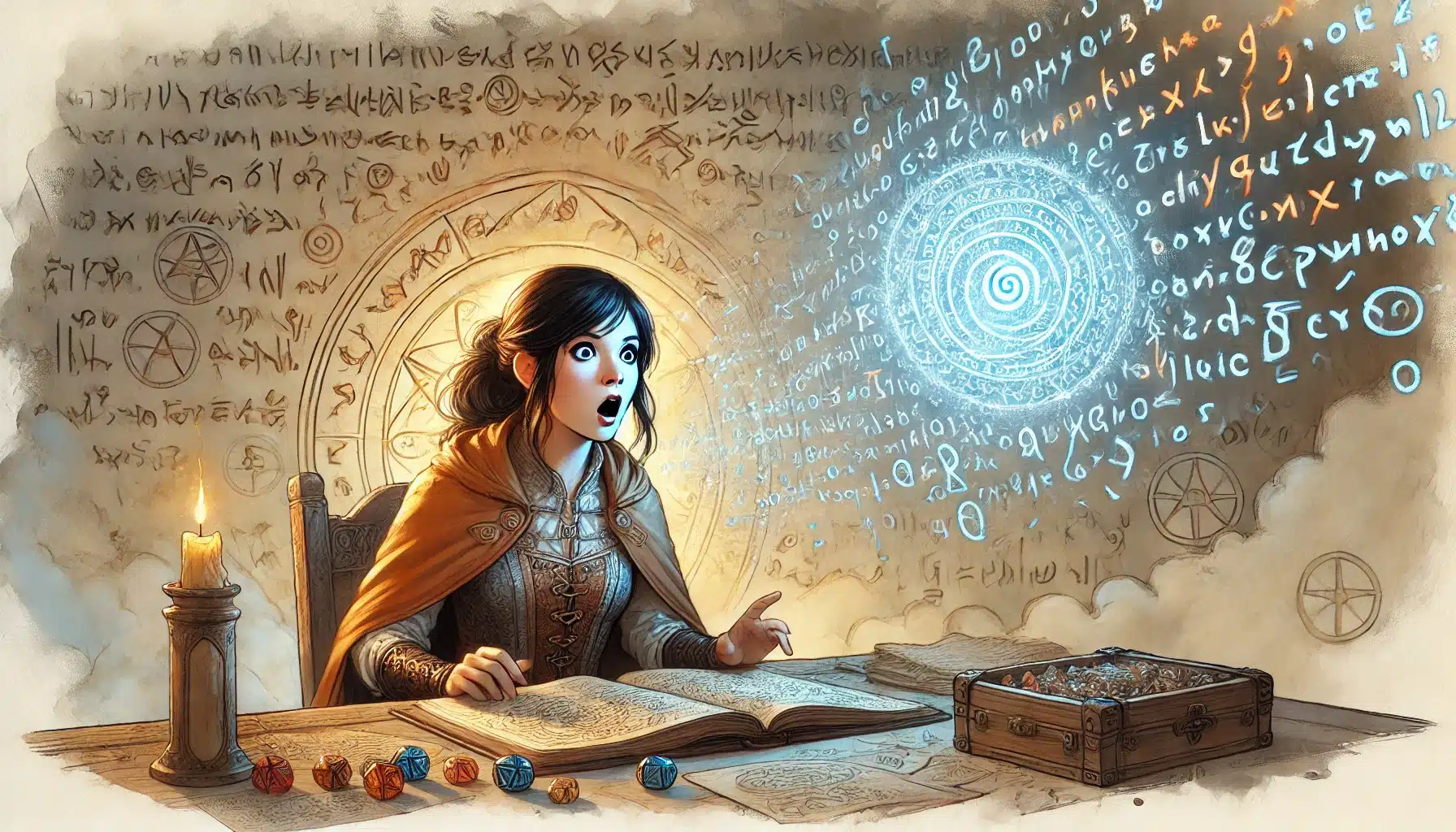Imagine a scene where you and your friends gather around the table for a session of Dungeons & Dragons. But this time, something’s different. Instead of your usual living, breathing Dungeon Master, it’s an AI—powered by GPT-4 or another language model—guiding your adventure. We’re seeing this shift as players experiment with using AI as their DMs, either to replace human counterparts or to bolster their creativity. The allure? Infinite improvisational possibilities and the thrill of the unknown, all made possible by the increasing accessibility of AI tools.
Recently, a graduate student project shook the community by training a specialized AI DM using a mix of official D&D modules and transcripts from popular games like Critical Role. The results were impressive: coherent narratives worthy of some praise, but not without controversy. This raises a central question: Can AI truly replicate or even enhance the deeply human experience of storytelling found in tabletop games? The thought of an AI capable of pulling off complex story arcs is appealing to some, who see it as a potential revolution. But others are hesitant, pointing to the narrative, creative, and ethical challenges we might face along the way.
The rise of AI DMs highlights a fascinating moment in gaming history. On one hand, they’re hailed as potentially transformative, offering new layers of interaction and creativity. On the other, they pose questions about consistency, emotional engagement, and moral decision-making. While it’s exciting to think about an AI seamlessly crafting a story involving your half-elf rogue and her band of misfits, the reality might be a bit more complex.
For every enthusiast keen to embrace AI’s storytelling capability, there is a skeptic warning of a potential loss of richness and depth. It’s not just about whether an AI can follow the rules or craft a plot twist. It’s about whether it can capture the emotional nuance and moral ambiguity essential to immersive storytelling. As discussions continue, one thing remains clear: AI in tabletop games is sparking a conversation about where we’re headed.
Ultimately, while the promise of AI-driven DMs is compelling, the perils remind us to tread cautiously. Whether we find an AI helping us explore uncharted territories or confronting new ethical dilemmas, this burgeoning technology will require us to balance innovation with the integrity of the stories we hold dear.
Exploring the Capabilities of AI Dungeon Masters
Enter the world of AI DMs, where the magic of language models like GPT-4 comes into play with surprising flair. These models have shown they’re capable of managing NPC dialogue, crafting expansive worlds, and pacing narratives in real-time—admittedly with a touch of unpredictability. Some adventures guided entirely by AI have showcased remarkable narrative complexity, demonstrating creativity that even seasoned DMs might admire.
Try my AI Tabletop RPG generators...and an extensive library of content!
In various experiments, these AI DMs operate with the finesse of a seasoned storyteller. By fine-tuning language models on specific modules or lore, users have found that the AI exhibits improved consistency and thematic accuracy. When it comes to rule interpretation and improvisation, the AI displays a unique adaptability, juggling multiple player interactions without the human flaw of fatigue. Players appreciate the unbiased adjudication and the fresh perspective an AI brings to their campaigns.
Despite these advantages, AI DMs face limitations, particularly in the arenas of nuance and emotional depth. The AI excels in its accessibility and impartiality, offering a game master who is always available, bursting with creativity but still lacking the warmth of a human touch. It’s in the continuity and emotional resonance of a long campaign where the cracks may start to show.
With AI as your DM, the game can be free from the restraints of human availability, offering a perpetually prepared, unbiased guide on your quests. However, it’s essential to recognize the areas where AI falls short. While it manages hundreds of NPCs and adjusts to narrative shifts on the fly, its storytelling is often devoid of the emotional nuance that a seasoned human DM provides.
The appeal of AI DMs is undeniable, especially for those seeking new gaming experiences. But as we embrace these digital storytellers, it’s vital to remember their constraints. Combining AI’s strengths with human insight might be the key to unlocking truly enriched gaming adventures.
⚔️ Fantasy RPG Random Tables Books
Make life as a Gamemaster easier…
If you play Dungeons & Dragons, Pathfinder, or other fantasy RPGs, this
RPG random tables series
is packed with encounters, NPCs, treasure, and more. Available in eBook or print—either way, you’ll have a wealth of adventure ideas at your fingertips.
Benefits of Using AI as a Dungeon Master
Consider the unique advantages AI DMs bring to the table. One of the most lauded features is their 24/7 availability. No more scheduling conflicts or last-minute cancellations—your AI DM is ready whenever you are. For casual or solo players, this can be a game-changer, offering an impartial storyteller who’s always in the mood for an adventure.
There’s also the significant cost-saving aspect. For groups without a dedicated DM—or those looking to lighten their lead storyteller’s load—AI provides a viable solution. Its accessibility can be a boon for players who find traditional group dynamics challenging, particularly neurodiverse or socially anxious individuals. AI can model dialogue pacing, enforce rules, and even train new DMs by acting as a practice partner.
The potential for collaborative storytelling with AI is immense. Imagine the AI handling minor NPCs or generating intricate world details, freeing up the human DM to focus on overarching plotlines and key character moments. It’s a creative aid that can brainstorm quest ideas on the fly, making for a richer, more dynamic session.
- Unlimited memory for tracking campaign details
- On-the-fly lore and world-building
- Rule adjudication without bias
- Support for solo campaigns
- Capacity to manage hundreds of NPCs at once
- Multilingual support for diverse gaming groups
- Instant reference for game rules and mechanics
- Ability to run multiple campaigns simultaneously
- Consistency in rule enforcement
- Convenient for drop-in and drop-out sessions
- Quick generation of item descriptions and stats
- Accessible for all skill levels
- Removes scheduling conflicts due to availability
- Offers novel scenarios and unusual plot twists
- Provides unbiased player interactions
When AI is used as a co-DM or creative tool, it can significantly enhance the experience for both players and human DMs. Instead of fully replacing the deeply human art of storytelling, AI can serve as a support system—bridging gaps and enriching narratives. AI doesn’t have intentions; it’s an assistant shaping the game based on player actions and pre-set guidelines, creating a fusion of creativity that can transform tabletop adventures.

Narrative Challenges and AI Limitations
The storytelling prowess of an AI DM is alluring, yet it stumbles in areas where human intuition and empathy shine. AI lacks intent—a fundamental aspect of nuanced storytelling—and when it comes to memory persistence during long campaigns, the limitations become evident. Without the ability to remember previous story arcs or player choices over time, tonal inconsistencies can appear, leading to bland or repetitive characterizations that don’t quite hit the mark.
Handling moral ambiguity, developing character arcs, and crafting dramatic tension are tasks where AI struggles, especially in prolonged narratives. In some AI-generated adventures, narrative coherence dissolved due to recursion, forgetfulness around key plot points, or a tendency to prioritize rigid logic over engaging drama. These shortcomings underscore the AI’s struggle with storytelling’s emotional core, often repeating tropes or mishandling sensitive content without nuanced understanding.
Consider a game where an AI DM forgets a crucial betrayal subplot introduced early in the campaign. This lapse disrupts the narrative’s emotional build-up, leaving players frustrated. Similarly, AI sometimes mishandles mature themes, unable to navigate the intricate web of context needed to address sensitive or complex content appropriately.
In the grand comparison of storytelling and gameplay facilitation, here’s where human DMs, AI-only DMs, and hybrid systems stack up:
| Aspect | Human DMs | AI-only DMs | Hybrid Systems |
|---|---|---|---|
| Creativity | High | Moderate | High |
| Continuity | Strong | Inconsistent | Improved |
| Emotional Nuance | Deep | Lacking | Enhanced |
| Rule Enforcement | Flexible/Variable | Consistent | Balanced |
| Improvisation | Dynamic | Systematic | Adaptive |
| Player Immersion | Engaging | Varies | Holistic |
| Adaptation to Players | Personalized | Standardized | Customizable |
| Lore Consistency | Player-dependent | High | High |
| Empathy and Relatability | High | None | Improved |
| Complex Scenarios | Intricate | Simplified | Complex |
| Predictability | Unpredictable | Predictable | Balanced |
| Humor and Tone | Rich | Awkward at times | Enhanced |
AI can certainly imitate aspects of storytelling, but lacks the intentionality and intuition innate to human DMs. This gap often leads to missed opportunities for emotional resonance. Meanwhile, hybrid systems harness the best of both worlds, blending AI’s systematic strengths with human creativity and empathy, paving the way for more enriching experiences. Integrating human storytellers with AI tools might just be the next frontier, creating opportunities for innovation that capitalize on each method’s strengths and mitigate their weaknesses.
Ethical and Legal Questions in AI-DM Training
The development of AI DMs stirs up considerable discussion around ethical and legal boundaries, especially when tapping into copyrighted or fan-made content. Take the use of Critical Role transcripts, for example. These beloved narratives are shaping AI’s responses without clear consent, raising questions about fan enthusiasm conflicting with creators’ rights. The lines of fair use blur when unofficial material forms part of the training regime.
Consider the graduate student project that brazenly utilized this content for AI training. It sparked varied reactions—some fans delighted in new AI narratives, while others, concerned about the ethics, called out the lack of permission. The tension between innovation and intellectual property underscores the broader ethics of AI training. Consent, proper attribution, and clear monetization strategies for AI-generated content remain essential yet unresolved topics.
- Consent issues in data usage
- Misrepresentation of creative intent
- Replication of toxic tropes without context
- Lack of credit to original creators
- Commercialization of fan-made content
- Unauthorized use of proprietary transcripts
- Ethical ambiguity in AI-generated content
- Cultural appropriation concerns
- Lack of accountability in content sharing
- Potential for AI biases to reinforce stereotypes
This landscape necessitates ethical frameworks and clear guidelines, crafted with input from creators whose works form the AI’s foundation. Transparency and collaboration could allow AI-DMs to evolve responsibly, providing benefits without trampling on the rights of those who breathe life into these stories. The future will hinge on our ability to address these concerns diligently, ensuring that creativity is respected and preserved in partnership with technological advancement.
⚔️ Fantasy RPG Random Tables Books
Make life as a Gamemaster easier…
If you play Dungeons & Dragons, Pathfinder, or other fantasy RPGs, this
RPG random tables series
is packed with encounters, NPCs, treasure, and more. Available in eBook or print—either way, you’ll have a wealth of adventure ideas at your fingertips.
The Future of AI and Human DM Collaboration
Imagine the dungeon of the future—a realm where AI and human DMs unite to create richer, more dynamic storytelling experiences. As we look ahead, it’s clear that the future of tabletop RPGs won’t be marked by the replacement of human creativity but rather by the augmentation of it through AI’s capabilities. Rather than stepping in as the sole narrator, AI is carving out a niche as a powerful assistant. It’s a tool for ideation, for generating intricate backgrounds, and even for scripting NPCs—a palette of creativity ready to be tapped by any human DM.
Game design communities are already abuzz with efforts to formalize AI’s role in session planning and storytelling. There are projects underway that weave AI into the fabric of game design, ensuring it complements the human imagination. From automating monotonous tasks to providing spontaneous narrative twists, AI offers a promising medium for interactive storytelling where the human hand remains the guiding force.
Think of AI as a collaborator that shares the spotlight with human DMs. It’s a partnership where AI handles the minute details that can bog down gameplay, such as tracking NPC inventories or managing complex stat sheets. This allows humans to focus on crafting the overarching narrative and fostering the emotional journeys that players crave. AI’s potential to elevate storytelling is vast, yet it relies on thoughtful integration where the human heart and soul of the game remain forefront.
This collaborative dance suggests a new dawn for RPGs—where AI doesn’t overshadow the human touch but enhances it. The blend of machine precision and human intuition opens up unprecedented storytelling possibilities. By working together, AI and human DMs can explore new creative horizons, inviting more players into the storytelling fold. It’s a partnership that’s less about taking control and more about sharing the creative load, making every gaming session richer and more immersive.
Designing Hybrid Play Systems
Let’s talk design philosophy. At the heart of mixed AI-human DM systems is a simple yet profound idea: let AI handle the complexities, while humans navigate the nuances. Picture campaigns where human DMs guide the core story arc, providing the heart and soul, while AI manages the dynamic side content—such as merchant interactions or the gritty details of dungeon descriptions. This setup allows players to engage in a vivid world that’s alive with detail, without overwhelming the DM.
Software setups are evolving to support these hybrid play systems, embedding AI modules directly into virtual tabletops or dedicated gaming apps. These tools offer seamless integration, allowing human DMs to tap into AI’s capabilities at the touch of a button. Whether it’s generating on-the-spot NPC dialogues or maintaining the game’s lore, these setups enhance the gaming experience without sacrificing the warmth of human interaction.
Yet, the social and design implications of these systems are significant. It’s crucial to clearly distinguish between AI-generated content and human storytelling. By tagging AI contributions or using distinct narrative markers, players can appreciate the collaborative effort without confusion. This transparency fosters a richer gameplay experience that respects both the AI’s contributions and the human touchstones of storytelling.
Try my AI Tabletop RPG generators...and an extensive library of content!
- Let AI manage time-consuming mechanics like inventory tracking.
- Clearly tag AI-generated content to separate it from human-crafted narratives.
- Test tone consistency to maintain narrative cohesion.
- Use AI to pre-generate NPC stats and backstories.
- Limit AI input to specific narrative layers, reducing overload.
- Employ AI for quick scenario setups or surprise twists.
- Integrate AI as a dynamic world-building tool.
- Preserve emotional depth by retaining human control over primary plotlines.
- Set clear boundaries for AI’s role in decision-making.
- Allow AI to suggest but not dictate player outcomes.
- Use AI for quick rule clarifications or adjudications.
- Provide players with insights into the AI’s decision-making processes.
- Encourage feedback on AI’s handling of game elements.
- Use AI for brainstorming narrative branches and resolutions.
- Regularly update and refine AI’s narrative datasets.
- Establish a balance between AI precision and human adaptability.
When AI is seen as a tool rather than a storyteller, the creative synergy can be remarkable. Human intuition and improvisation craft the emotional resonance that AI currently lacks. This thoughtful integration ensures that every gaming session retains its soulfulness, driven by the unique charm of human-kindled imagination. The magic lies in pairing machine efficiency with the unpredictable, heartfelt journeys only humans can construct.

Final Thoughts on AI as Dungeon Master
So where does this leave us on the question of AI as a DM? AI can certainly support or emulate a DM’s role, offering countless benefits to the experience. But for now, it rarely replaces the full spectrum of human storytelling. As we reflect on the evolving nature of storytelling, these tools offer not only new avenues for creativity but also democratize access to RPGs. For new players, AI can be a tutor, guiding them through the intricacies and supporting more seasoned players eager to explore their narratives in fresh ways.
AI-assisted storytelling is a sandbox—a playground of possibilities—where both DMs and players can experiment, expand, and evolve. By remaining ethically mindful and embracing ongoing experimentation, the gaming community can ensure that AI helps, rather than hinders, the essence of these adventures we cherish. Embracing AI as a co-creator means acknowledging it as a brilliant assistant, setting the stage but never stealing the show.
We are at the cusp of a new era in storytelling. One that requires embracing the potential of AI while safeguarding the heart of what makes games like D&D a cultural touchstone—the human connections, the shared laughter, the moments of triumph. It’s about the stories that unfold through rolling dice and whispered strategy, infused with the magic of human imagination.
As we continue to explore this unique merger of magic and machine, let’s approach with both curiosity and caution. AI presents an opportunity to enhance our storytelling worlds, lending its endless capabilities while we, the storytellers, hold the reins. The next age of gaming promises to be an exciting chapter where technology serves the narrative—an era where the game table becomes a meeting place of magic and machine, each enhancing the other in our shared quest for adventure.










